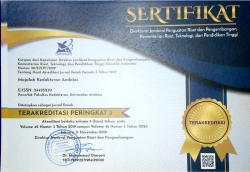Abstract
Abstrak
Tujuan studi ini adalah untuk menjelaskan mekanisme resistensi parasit malaria dan
usaha-usaha yang dapat dilakukan untuk menghadapi munculnya strain parasit yang
resisten terhadap artemisinin. Metode yang digunakan adalah studi kepustakaan. Resistensi
P.falciparum terhadap obat-obat anti malaria disebabkan oleh perubahan spontan yang
terjadi pada beberapa gen seperti P.falciparum multi drug resistance1 (Pfmdr1), P.falciparum
chloroquine transporter (Pfcrt), P.falciparum dihydropteroate synthase (Pfdhps), P.falciparum
dihydrofolate reductase (Pfdhfr), and P.falciparum multidrug resistance-associated proteins
(Pfmrp). Penyebaran resistensi tersebut dipengaruhi oleh tingkat transmisi di sebuah wilayah.
WHO telah menjalankan usaha untuk menanggulangi penyebaran resistensi tersebut misalnya
dengan merekomendasikan penghentian monoterapi artemisinin, dan pemberian anti malaria
setelah konfirmasi laboratorium. Selain itu, perlu adanya penggunaan obat kombinasi, produksi
rejimen dosis tetap, dan pengembangan obat anti malaria baru. Kesimpulan dari hasil studi
ini ialah munculnya malaria resisten terhadap artemisinin akan menghambat usaha eradikasi
malaria karena itu diperlukan usaha-usaha untuk menanggulanginya.
Abstract
The objective of this study was to describe the development of anti-malarial drug resistance
of the parasites and the efforts taken to contain the emergence of artemisinin resistant malaria.
This was a literature study. The development of resistance to anti-malarial drugs are due to
spontaneous changes in certain genes such as of P.falciparum multi drug resistance1 (Pfmdr1),
P.falciparum chloroquine resistance transporter (Pfcrt), P.falciparum dihydropteroate synthase
(Pfdhps), P.falciparum dihydrofolate reductase (Pfdhfr), and P.falciparum multidrug resistanceassociated
proteins (Pfmrp). The spread of the resistance depends on the transmission rate
within each area. WHO has established a global plan to contain the spread of this resistance,
such as recommendation to withdraw artemisinin-based monotherapies and administration
of treatment after laboratory confirmation. In addition, administration of anti-malarial drug
combination, production of fixed dose regimen and development of new drugs are necessary.
The Conclusion is emergence of artemisinin resistant malaria will threaten malaria eradication
thus some efforts are necessarily needed to contain it.
Afiliasi penulis: Bagian Parasitologi Fakultas Kedokteran Universitas Hasanudin





















